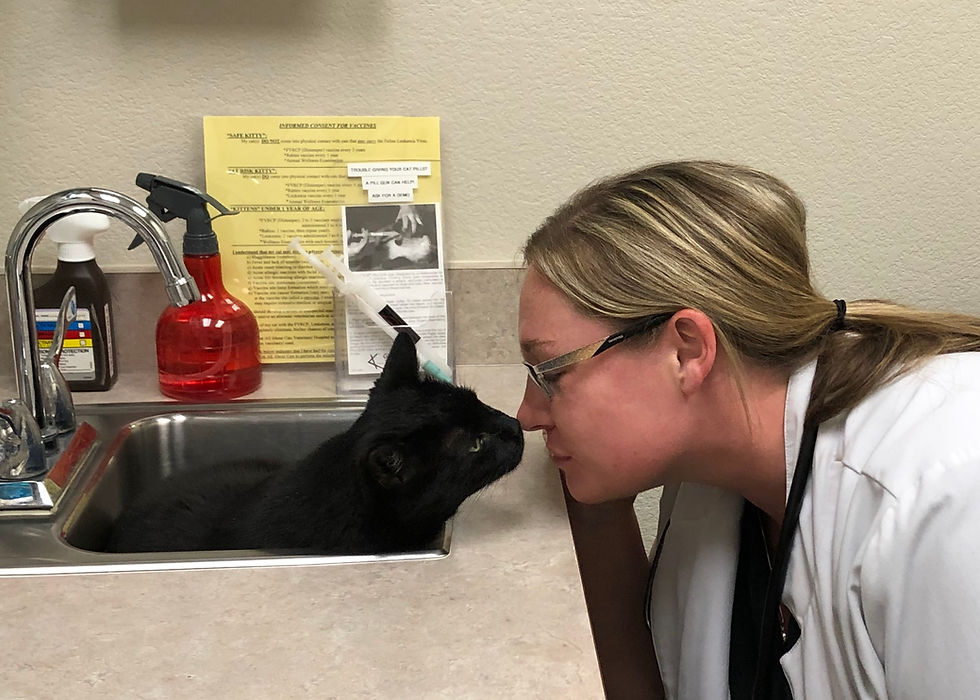Symptoms of cat cancer
- thecathospitallv
- Jun 2, 2025
- 3 min read
Updated: Nov 28, 2025
Understanding Symptoms Cancer in Cats: What Every Cat Owner Should Know
From the Desk of Your Las Vegas Cat Hospital Feline-Only Veterinary Team
As veterinary professionals dedicated exclusively to feline health, one of the most difficult conversations we have with cat parents is about cancer. While it’s never easy to hear that a beloved pet may have cancer, awareness is the first step in ensuring early detection, effective care, and a better quality of life for your cat.

What is Cancer in Cats?
Cancer is the uncontrolled growth of abnormal cells. These cells can form a tumor (solid mass) or affect the blood and organs more diffusely. While some tumors are benign (non-spreading), malignant cancers can spread (metastasize) to other parts of the body.
Cats can develop many types of cancer, but some of the more common ones we see include:
Lymphoma (a cancer of the lymphatic system, often linked to FeLV or IBD)
Squamous Cell Carcinoma (particularly in the mouth or skin)
Mammary Tumors (in females who are unspayed or were spayed after 6 months of age)
Soft Tissue Sarcomas or Fibrosarcomas
Symptoms of Cat Cancer
Cats are masters at hiding discomfort. That’s why early signs of cancer are often subtle —and easily mistaken for less serious conditions. Here are some red flags to look for:
Unexplained weight loss
Loss of appetite or picky eating
Lumps or bumps under the skin that persist or grow
Chronic vomiting or diarrhea
Difficulty breathing or coughing
Bad breath or oral bleeding
Wounds that don’t heal
Lethargy or hiding more than usual
Lameness or difficulty moving
Changes in litter box habits or urination
If you notice any of these symptoms — especially if they persist — don’t wait. A quick exam with Dr. Love could make all the difference.
Diagnostic Tests We May Recommend
Diagnosing cancer requires a combination of a thorough physical exam and advanced diagnostic tools. At our feline-only hospital, we use cat-specific handling techniques to keep your cat as calm and comfortable as possible during testing. Depending on your cat’s condition, we may recommend:
🧪 Bloodwork & Urinalysis To check for internal abnormalities, organ function, and rule out other conditions.
🖼 X-rays (Radiographs) To detect tumors, evaluate the chest and abdomen, and check for spread (metastasis).
🧬 Ultrasound Allows us to visualize internal organs in detail and guide sample collection.
🔬 Fine Needle Aspiration (FNA) or Biopsy We may collect a small sample of cells or tissue for laboratory analysis to determine whether a
mass is cancerous.
🧫 Cytology & Histopathology Lab evaluation of cells and tissues can confirm the type of cancer and help guide treatment.
🧪 FeLV/FIV Testing Because viruses like feline leukemia (FeLV) and feline immunodeficiency virus (FIV) can increase cancer risk, we often recommend testing in suspected cases.
What If It Is Cancer?
A cancer diagnosis is never easy, but it’s not always a death sentence. Depending on the type, location, and stage of the cancer, treatment options may include:
Surgery to remove tumors
Chemotherapy (cats often tolerate it better than humans!)
Palliative care to maintain comfort and quality of life
Dr. Love and the LVCH team work closely with cat owners to create personalized, compassionate care plans tailored to the individual needs of each cat — always considering both treatment goals and your cat’s well-being.

Final Thoughts
Cancer in cats is heartbreaking, but it doesn’t have to mean the end of hope. With early detection and supportive care, many cats can continue to enjoy a comfortable and meaningful life.
If your cat has been acting differently or showing any of the signs listed above, we encourage you to request an exam. Trust your instincts — you know your cat best, and we’re here to help every step of the way.
Your partners in feline health, Dr. Ashley Love, BVMS, DABVP (Feline Practice) — Cat-Only. Fear-Free. Compassion-First. Las Vegas Cat Hospital




Comments